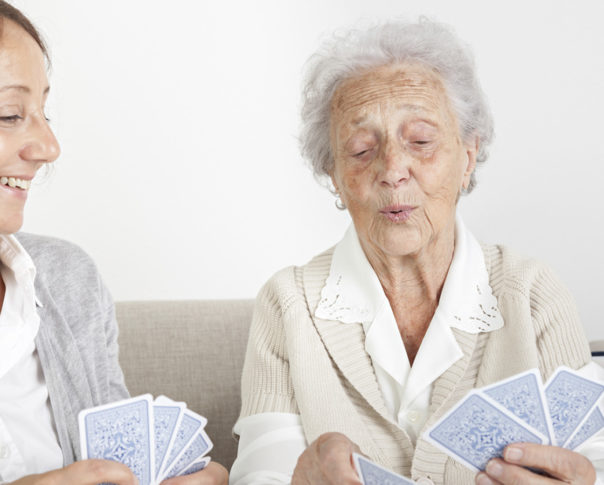Roughly 6 million people of all ages in the United States are currently living with Alzheimer’s - this includes mostly people over the age of 65 but also 200,000 people under the age of 65 with an early onset version of the disease. One in every ten people over the age of 65 develops Alzheimer’s, which is a very large percentage. So what can you do to decrease your, or a loved one’s, risk for developing Alzheimer’s?
New research presented at the Alzheimer’s Association International Conference 2019 suggests there are 5 critical factors that you can change about your lifestyle that will significantly decrease your risk for developing the disease. This research is incredibly important because it shows that risk factors for the disease can be modified and that you can truly make a difference with lifestyle changes, regardless of genetics or predisposition for the disease. See what 5 lifestyle factors you can change below.
1. Diet
One of the biggest factors that affects our health is what we eat. People have known for ages that what we put in our body impacts our health, our chance of disease, and our longevity - and now, that it can decrease our risk for the development of Alzheimer’s and dementia. So what changes can you make in your diet? Scientists recommend a combination of a DASH and Mediterranean diet. The DASH diet is prescribed by doctors to prevent and treat high blood pressure and blood cholesterol. The foods in a DASH diet are low in sodium and high in other nutrients that lower blood pressure like potassium, calcium, and magnesium. The DASH diet includes lots of whole grains, fruits, vegetables and low-fat dairy products, fish, poultry and legumes, and encourages a small amount of nuts and seeds a few times a week. You can learn more about the DASH diet and its recommendations here - (https://www.mayoclinic.org/healthy-lifestyle/nutrition-and-healthy-eating/in-depth/dash-diet/art-20048456).
The Mediterranean diet is more of a long-term lifestyle diet, while the DASH diet is for losing weight or changing blood pressure levels in a short amount of time. The Mediterranean diet, as the name suggests, is based off of a typical diet found in Mediterranean countries. This diet consists of large amounts of fruits, vegetables, and whole grains, medium amounts of fish, dairy and healthy fats, and small amounts of meat and sweets. The important fact about the Mediterranean diet is that it is plant based instead of meat based. Meals are built around vegetables, fruits, herbs, nuts, beans and whole-grains with sides of dairy, seafood, poultry and eggs. Red meat is only eaten on occasion. You can learn more about the Mediterranean diet and its recommendations here - (https://www.mayoclinic.org/healthy-lifestyle/nutrition-and-healthy-eating/in-depth/mediterranean-diet/art-20047801).
2. Exercise
Regular exercise is important to stay physically and mentally fit. People who are active and fit are less likely to have a decrease in mental function and less likely to develop Alzheimer’s disease later in life.
Exercising is important because it can:
• Sharpen reasoning skills in healthy individuals
• Improve memory and judgment skills in healthy individuals
• Delay the onset of Alzheimer’s for people at risk or with a genetic predisposition
• Slow the progress of the disease in people who already have Alzheimer’s
So how much exercise is enough to make an impact? The World Health Organization (WHO) recommends that “individuals aged 65 and above engage in 150 minutes of moderate-intensity aerobic exercise every week, or 75 weekly minutes of vigorous-intensity aerobic exercise.” Examples of aerobic exercise are brisk walking, running, swimming, tennis, cycling (inside or outside), dancing, taking a spin class, using the elliptical machine, etc. Many of these, like swimming, are low impact and good for people who are already over the age of 50 or who have had previous injuries.
3. Smoking
Alzheimer’s specifically is known to be linked with problems of the vascular system, i.e. your heart and bloodstream. Smoking increases your chance of vascular problems, strokes and mini bleeds in the brain - all of which are also risk factors for dementia. Chemicals in cigarettes can also cause inflammation and oxidative stress, which both increase your chance of developing Alzheimer’s, as well as a plethora of other diseases. Some research says that 14% of dementia cases can be attributed to smoking. But don’t worry, stopping at any point in your life will still have an impact on your Alzheimer’s risk. It’s never too late to adopt healthier lifestyle practices.
4. Drinking
Don’t worry - we’re not about to tell you to stop drinking altogether. Thankfully, drinking in moderation has no significant impact on your risk for developing Alzheimer’s. However heavy drinking and binge drinking will lead to brain damage over time, reducing the amount of your brain’s white matter - the material that provides synapse connections between different sections of your brain. It can also lead to a lack of vitamin B1, eventually affecting short term memory.
So what is moderate alcohol consumption? The NCS says that 1-14 units of alcohol per week for women and 1-21 units a week for men is considered light to moderate.
• A typical glass (175mL) of (12%) wine = 2 units
• A pint of lower (3.6%) alcohol beer or cider = 2 units
• A pint of higher (5.2%) alcohol beer or cider = 3 units
• A single shot (25mL) of spirits such as whisky, gin or vodka (40%) = 1 unit
5. Cognitive Activities
Increased cognitive activity in early life is known to be associated with decreased cognitive decline and a decreased risk for Alzheimer’s and dementia. The new research presented at the Alzheimer’s Conference shows that increasing your cognitive activity at any point in your life can decrease your risk for Alzheimer’s. So what can you do to increase your cognitive activity? Anything that keeps your brain active like crossword puzzles, sudoku, reading books, puzzles, playing card games, etc. “Your brain is like any other muscle in your body — the more you strengthen it, the more resistant it will be to environmental and physical stress,” Tousi explains.
A new study by Ko et. al published in the Frontiers in Aging Neuroscience Journal also shows that increased childhood cognitive activities, like taking music lessons or learning a new language, could greatly decrease the risk of developing both Alzheimer’s and dementia. Encouraging your kids to stimulate their brains will help them further down the road. But it’s also important to know that any cognitive activity increase at any age will help reduce your risk for Alzheimer’s. So it’s never too late to pick up a new brain stimulating activity.
https://www.ncbi.nlm.nih.gov/pmc/articles/PMC5875443/
So what does this all mean for me?
So what does this actually mean for you? How much will changing these factors actually impact your risk of developing Alzheimer’s? Research shows that people who changed at least 4 of these habits had a 60% decrease in risk, and even people who only changed 2-3 of these habits still had a 37% decrease in risk. While most people would probably assume that not smoking or drinking would have a positive impact on your body, this research emphasizes the magnitude of these small changes. Even people with an increased genetic risk can still decrease the chance of developing the disease if they change these 5 lifestyle factors.
“What we are starting to see, across the board, whether you inherited a genetic predisposition to dementia or live in a place that increases your risk, is that you may be able to overcome some of this with lifestyle,” Carrillo says. “Even more exciting, even a little bit counts.
If you are looking for a provider for live-in care in Florida with experience caring for individuals with Alzheimer's, American In-Home Care and our family of caring companies, Whitsyms In-Home Care, Advocate In-Home Care and Douglas In-Home Care can help. We refer qualified and compassionate care providers that are matched directly with your loved one's personality and needs. We can refer care providers that specialize in Alzheimer's and dementia care, and who have training and continuing education in this area to ensure they provide the highest quality of care to your loved one, and that you and your loved one are in the best hands.
Interested in our Senior Care Services ? Click here to see our locations and service areas.
Interested in Care Provider opportunities? Click here to start registration.




